Episodes
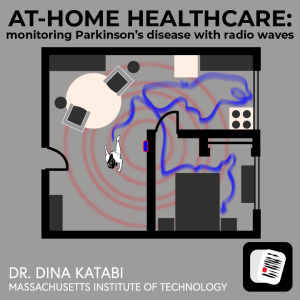
Wednesday Nov 16, 2022
Wednesday Nov 16, 2022
The prevalence of Parkinson’s disease has grown more than 50% in recent years, and early onset diagnosis is increasing at an even faster rate. Due to its slow, subtle progression and variable response to medications, this condition can be difficult for clinicians to manage. The work of Dr. Dina Katabi, Director of the MIT Center for Wireless Networks and Mobile Computing, may change that. Her team has shown that discrete, radio wave emitting devices in the home can be used to track patient movement and health parameters like sleep quality. In this episode, Dr. Katabi explains how this work will make healthcare more precise and accessible than ever before. Music Credits: “Land of the midnight sun” and “I hope you hear this” by Rukudzo.
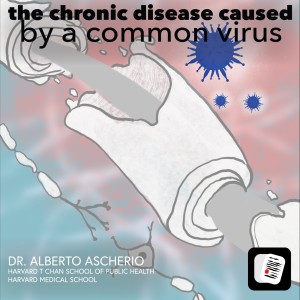
Wednesday Jun 01, 2022
Wednesday Jun 01, 2022
Over 2.8 million people worldwide live with multiple sclerosis (MS), a disease in which the body’s immune system attacks the protective myelin coating around nerves in the brain and spinal cord. People with MS can experience pain, fatigue, memory problems, vision loss, and other debilitating symptoms. MS is relatively rare, but new research has found a causal link between Epstein-Barr Virus, one of the most common human viruses, and MS. In this episode, we talk to Dr. Alberto Ascherio, a Professor of Epidemiology at Harvard School of Public Health, about the 20-year longitudinal databank that reveals Epstein-Barr Virus as a causal factor in MS.
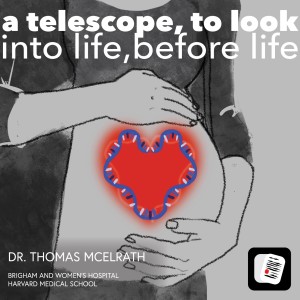
Wednesday May 11, 2022
Wednesday May 11, 2022
Imagine having a telescope that could allow you to see whether a syndrome will manifest in the future. Imagine being able to use it to cure diseases before they can even occur. For Dr. Thomas McElrath, MD-PhD in the Division of Maternal-Fetal Medicine at the Brigham & Women’s Hospital, this telescope exists and is called LIFECODES. The LIFECODES Biobank is an extensive biobank of samples collected for over 14 years with data on over 6,000 pregnancies. It is used to look at biomarkers associated with pregnancy complications and the effects of environmental exposures on pregnancy outcomes. In this episode, we have interviewed Dr. McElrath to talk about his recent work published in Nature. He has leveraged these data to shed light on normal pregnancy progression to uncover new biomarkers that can be used to diagnose syndromes months before clinical presentation.
“Zenyatta is my Spirit Animal and Hyacinths’’ music composition administered by Rukudzo © 2022 Rukudzo Kanyemba. All rights reserved.
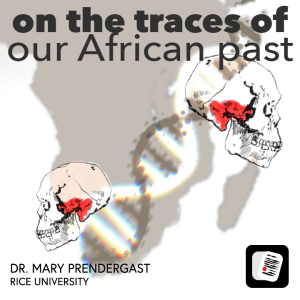
Wednesday Apr 20, 2022
Wednesday Apr 20, 2022
We do not often think about our past as a species. What are the changes that made us like we are now? When, where, and why did these changes happen? Can we go back in history and find the answers to these questions? Archaeologists reconstruct human behavior in the past, mainly using things that people left behind, or this is what they used to do. In recent years, the possibility to study ancient DNA has revolutionized our way of looking at the past. Ancient DNA allows us to explore human diversity in different places and times and understand what factors shaped it, revealing mysteries about our history. We have interviewed Mary E. Prendergast, Assistant Professor of Anthropology at Rice University and a leader of one of the largest-scale studies of ancient DNA in Africa. Listen to this episode to find out how Dr. Prendergast and her team could use ancient DNA from individuals who lived between 18,000-400 years ago to explore how people interacted as far back as the last 80,000-50,000 years. Music by Doug Maxwell, “A good day on the African Planes” and Joel Cummings, “Robots and Aliens”.
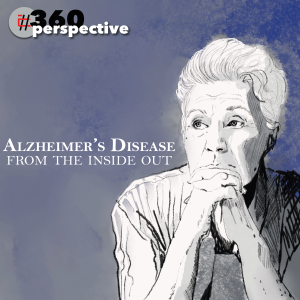
Wednesday Mar 30, 2022
Wednesday Mar 30, 2022
Alzheimer’s disease affects millions of people and their families. Scientists have made extraordinary progress characterizing the pathology of Alzheimer’s and working to find effective treatments. As scientists continue to unlock more and more about the disease and how to combat it, how can we address the challenges currently facing doctors, patients, and caregivers? In this 360 Perspective episode, we talk about the history of Alzheimer’s, the stigma surrounding it, disparities in healthcare, and the impacts on caregivers. We interviewed Drs. Carl Hill, Stephanie Kalb, Jason Karlawish, Gad Marshall, and Stephen Salloway to discuss these issues.
Music credits: Myuu - “Suspicious”
Sneaky Snitch Kevin MacLeod (incompetech.com). Licensed under Creative Commons: By Attribution 3.0 License
Additional music provided by Aaron Troutman.
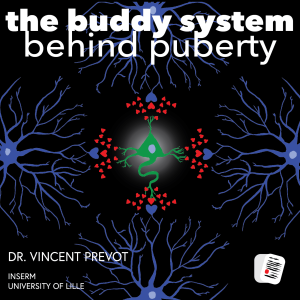
Tuesday Mar 08, 2022
Tuesday Mar 08, 2022
Puberty may seem like a chaotic phase of life, but the process is precisely controlled by a series of timed signals beginning in the brain. Before we are born, a set of neurons secreting GnRH (gonadotropin-releasing hormone) migrate to the brain and set up the hub that will control reproductive processes. During this time, these neurons recruit newborn astrocytes, and they stick together throughout life. In this episode, we speak with Dr. Vincent Prévot, Director of the Development and Plasticity of the Neuroendocrine Brain Team of INSERM, to discuss his research on the neuroendocrine regulators of reproduction. Dr Prévot tells us about how the GnRH neurons actively recruit astrocytes, and how this process can be interrupted. Listen to hear more about the processes that lead to puberty, environmental factors that affect the natural timing of puberty, and why it is important for puberty to happen at the “right time.” Additional music provided by Aaron Troutman.
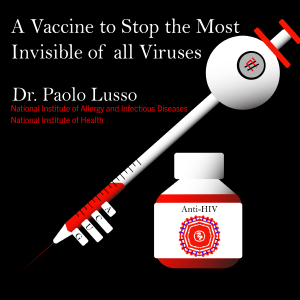
Wednesday Feb 16, 2022
Wednesday Feb 16, 2022
The disease that would ultimately become known AIDS was first diagnosed in June 1981. At that time, researchers had not yet determined what caused it, and by the time most patients presented with symptoms, they had only months to live. After four decades of effort by the global research community, the development of promising experimental HIV vaccines has now finally come true. We have interviewed Dr. Paolo Lusso, Chief of the Viral Pathogenesis Section at the National Institute of Allergy and Infectious Diseases, to discuss his research in developing and testing promising HIV vaccines. In this episode, Dr. Lusso explains why it took so long to develop a vaccine with the potential to defeat this “master of disguise and transformation”, words he uses to refer to HIV. Listen to this episode to learn more about the immune system, the process of developing a vaccine, and the challenges scientists had to face to stop the most invisible of all viruses. “I miss you (reimagined)”, music composition administered by Rukudzo © 2022 Rukudzo Kanyemba. All rights reserved.
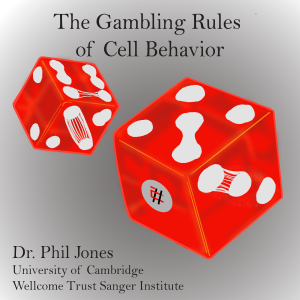
Wednesday Jan 26, 2022
Wednesday Jan 26, 2022
“Every gambler knows that the secret to survivin' is knowin' what to throw away and knowin' what to keep...”. Have you ever listened to “The Gambler” by Kenny Rogers? He knew how to play the game right, and it turns out that so does our body! Dr. Phil Jones, a Professor of Cancer Development at the University of Cambridge UK, works on uncovering the dynamics of cell behavior. He found that human cells play a dice game, balancing the odds between production and shedding. This game protects the genomes of our cells, throwing out most of the damage we accumulate during our lives. However, mutations can change the game's rules and increase the odds in favor of dividing cells, potentially leading to cancer. Acquiring mutations is easier than we think: ultraviolet light in sunshine or tobacco-derived chemicals can cause extensive mutations in our body. Despite this, our tissue can surprisingly continue to look and function normally. Listen to this episode to learn how normal tissues restrain the expansion of mutant clones, so very few of them progress to form tumors. Phew!

Wednesday Aug 11, 2021
Wednesday Aug 11, 2021
In the words of Dr. Ali Khademhosseini, "There is no question that tissue engineering will one day transform medicine.” After his first research experience at the University of Toronto, Dr. Khademhosseini fell in love with tissue engineering and its significant and life-changing impact on healthcare. Today, at the Terasaki Institute in Los Angeles, Dr. Khademhosseini focuses his research on developing various approaches to merge microfabrication techniques with hydrogel biomaterials to generate complex 3D tissues that mimic the natural cellular environment. In addition to being the author of more than 500 journal papers and speaker at more than 300 invited lectures, he is also the recipient of more than 60 major national and international awards and has been selected by Thomson Reuters as one of the World’s Most Influential Minds for five consecutive years. In this episode, Dr. Ali Khademhosseini tells us his story of discovery and passion for tissue engineering and shares some of his secrets for success. Are you in need of some inspiration? This episode is for you.
“Believe that you are resolving important things; if you do your work, you can change the world.” - Dr. Ali Khademhosseini
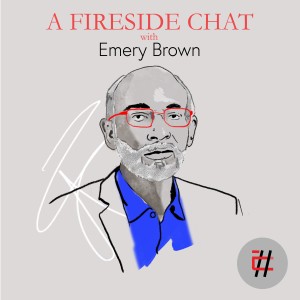
Wednesday Jul 21, 2021
Wednesday Jul 21, 2021
In 1846, Dr. John Collins Warren and William T. G. Morton performed the first public demonstration of surgery under an anesthetic. Today, anesthesiologist and statistician Emery Brown combines his fields of expertise and applies a computational approach to answer questions about neuroscience and to research how anesthetics interact with the central nervous system. Brown is a faculty member at Massachusetts General Hospital, Harvard, and MIT, and in this episode, he highlights that, while anesthesia practices in the operating room have evolved over the 175 years since Warren and Morton’s first anesthesia demonstration, medical understanding of how anesthetics work is still limited. His work pioneers a new approach to administering anesthetics to patients—by reading and using electrical activity in the brain to determine the appropriate dose of anesthetic. Brown’s curiosity is inspiring, as his exploration of diverse interests expands beyond biomedicine to foreign languages—in this episode, he also speaks on his approach to language learning and how he utilizes language learning in a clinical context. Music by Kevin MacLeod licensed under CC BY 4.0.


